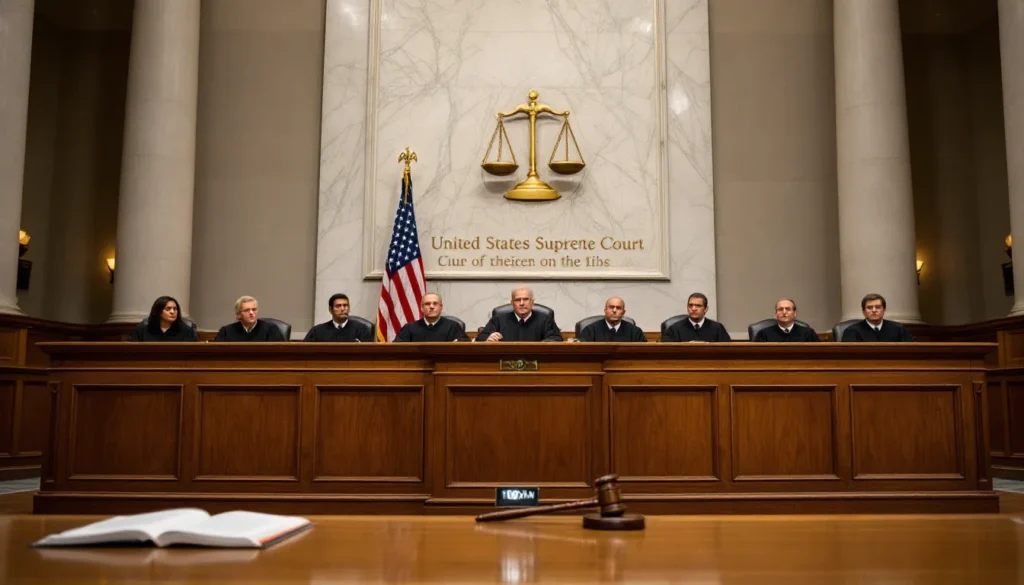Table of Contents
ToggleIn a landmark case that has everyone buzzing, Dobbs v. Jackson Women’s Health Organization is shaking up the conversation around reproductive rights in America. This case isn’t just another legal battle; it’s a high-stakes showdown that could redefine the landscape of women’s health. With opinions flying faster than a caffeinated squirrel, it’s crucial to understand what’s at stake.
As the Supreme Court gears up to weigh in, the implications could ripple through every corner of society. Whether you’re a staunch advocate or just trying to keep up with the latest headlines, this case is about more than just legal jargon—it’s about real lives, choices, and the future of healthcare. Buckle up, because this isn’t just a courtroom drama; it’s a pivotal moment that could change everything.
Overview of Dobbs v Jackson Women’s Health Organization
Dobbs v Jackson Women’s Health Organization represents a pivotal legal case concerning abortion rights in the United States. This case centers on a Mississippi law that prohibits most abortions after 15 weeks of pregnancy. The argument presented questions the constitutional validity of such restrictions under previous Supreme Court rulings, specifically Roe v. Wade and Planned Parenthood v. Casey.
Many states are closely monitoring this case due to its potential ripple effects on reproductive rights. The Mississippi law seeks to challenge the existing precedents that protect abortion access. Advocates argue that restrictions infringe upon women’s rights to make personal health care decisions. On the opposing side, proponents of the law assert the state’s interest in protecting fetal life and promoting maternal health.
Supreme Court deliberations in this case highlight the current ideological divisions among justices. Legal experts predict that the Court’s decision could either reaffirm or overturn nearly 50 years of established abortion rights. The implications extend beyond legal parameters, encompassing broader societal attitudes toward women’s health and autonomy.
Joe Biden’s administration has publicly opposed the Mississippi law, indicating its reverberations on national policy. Public opinion is sharply divided; many individuals express strong feelings about reproductive rights. This case represents more than just legal arguments; it embodies the struggle over women’s health and societal values.
Legal Background of the Case
Dobbs v. Jackson Women’s Health Organization rests on crucial legal precedents and state regulations. Understanding these elements clarifies the case’s significance in the realm of reproductive rights.
Previous Supreme Court Decisions
Roe v. Wade established a constitutional right to abortion in 1973. This landmark ruling affirmed women’s autonomy over reproductive choices. Planned Parenthood v. Casey in 1992 reinforced this right but allowed states to impose certain restrictions. Both decisions created a framework that protects women’s rights while balancing state interests. In contrast, Dobbs challenges this framework by questioning the validity of restrictions like Mississippi’s 15-week abortion ban. Legal experts argue that any ruling from the Supreme Court could significantly alter these precedents.
State Laws Involved
Mississippi’s law prohibits most abortions after 15 weeks, sparking debate on its constitutionality. This legislation emerged as part of a broader trend where states implement stricter abortion laws. Several other states, like Texas and Alabama, have passed similar measures aiming to limit abortion access. Advocates for the law argue it reflects a commitment to fetal life and maternal health. Opponents, however, see it as an infringement on women’s rights and a challenge to established legal precedents. The outcome of Dobbs could set a precedent, prompting additional states to consider similar restrictive measures.
Key Arguments Presented
The case of Dobbs v. Jackson Women’s Health Organization features significant arguments from both sides of the abortion debate. These arguments reflect deeply held beliefs concerning reproductive rights and state interests.
Proponents of the Law
Proponents argue that Mississippi’s law aims to protect fetal life after 15 weeks of pregnancy. They claim the legislation promotes maternal health and wellbeing by limiting certain abortion procedures. Advocates emphasize that states possess the authority to regulate medical practices, including those related to pregnancy. Many believe that advancing life at this stage fosters a culture that values both mothers and children. Supporters often reference scientific advancements in fetal development that show increased viability beyond this 15-week threshold.
Opponents of the Law
Opponents of the law contend that it jeopardizes women’s reproductive rights established for nearly 50 years. They emphasize that personal healthcare decisions, particularly around pregnancy, are inherently individual and should not be dictated by legislation. Advocates argue that restrictions disproportionately affect low-income women who may lack access to necessary resources. Concerns arise that such laws could lead to unsafe procedures and further restrict women’s autonomy over their bodies. Many opponents view this case as a pivotal moment in the fight for reproductive justice, underscoring the importance of upholding previous Supreme Court rulings such as Roe v. Wade and Planned Parenthood v. Casey.
Supreme Court Ruling and Its Implications
The Supreme Court’s ruling in Dobbs v. Jackson Women’s Health Organization carries significant ramifications for reproductive rights in the United States.
Immediate Effects on Abortion Rights
Immediate changes in abortion rights follow the decision. Many states with pre-existing trigger laws might swiftly enact bans or restrict access following a ruling that favors Mississippi’s law. Legal experts anticipate that states with less liberal abortion regulations may seize the opportunity to tighten restrictions. Consequences for women seeking abortions become clear, as access could diminish significantly in regions across the country. Furthermore, healthcare providers might face uncertainty in their practices, leading to differing standards of care depending on the state.
Long-term Legal Consequences
Long-term implications of the ruling extend beyond current accessibility. A reversal of Roe v. Wade could lead to a reevaluation of rights established over the last five decades. Legal experts highlight that future cases may reference the ruling, influencing state legislation and court decisions nationwide. Increased legal battles concerning reproductive rights might emerge, as states attempt to legislate according to their interpretations of the ruling. Additionally, the decision may prompt calls for new federal protections or amendments to the Constitution, reflecting ongoing societal debates surrounding women’s autonomy and healthcare.
Public Reaction and Advocacy Responses
Public reactions to Dobbs v. Jackson Women’s Health Organization have displayed a significant divide in societal perspectives on reproductive rights. Advocacy groups on both sides have mobilized to voice their positions loudly.
Support from Activist Groups
Many activist groups support the case aimed at overturning Roe v. Wade. Organizations such as the Susan B. Anthony List and the Family Research Council argue that the Mississippi law seeks to protect fetal life and promote maternal health. They emphasize that advancements in fetal development justify stricter regulations on abortion. Engaging their supporters, these groups conduct rallies and campaigns to raise awareness on what they view as a moral imperative. Additionally, they focus on educating the public about alternatives to abortion, such as adoption. This proactive stance underscores their commitment to fostering a culture that values both women and children.
Opposition and Protests
Opponents of the Mississippi law and supporters of abortion rights have organized extensive protests across the country. Various organizations, including Planned Parenthood and the American Civil Liberties Union, argue that restrictions threaten personal healthcare decisions. They emphasize that limiting access to abortion disproportionately affects low-income women and marginalized communities. Demonstrations often feature powerful statements and stories from those directly impacted by such restrictions. Advocates also stress that overturning decades of established rights could lead to increased legal battles and chaos within healthcare systems. These actions highlight a steadfast dedication to maintaining reproductive justice and autonomy over personal medical choices.
The Dobbs v. Jackson Women’s Health Organization case stands as a watershed moment in the ongoing debate over reproductive rights in the United States. Its implications extend far beyond the courtroom, affecting women’s health access and societal attitudes toward autonomy. As the Supreme Court prepares to issue its ruling, the outcome will likely reverberate across states and influence future legislation.
With passionate advocacy on both sides, this case highlights the deep divisions in public opinion and the critical nature of the discussions surrounding women’s rights. As the nation watches closely, the decision will not only shape legal precedents but also determine the future landscape of reproductive health and justice in America.




